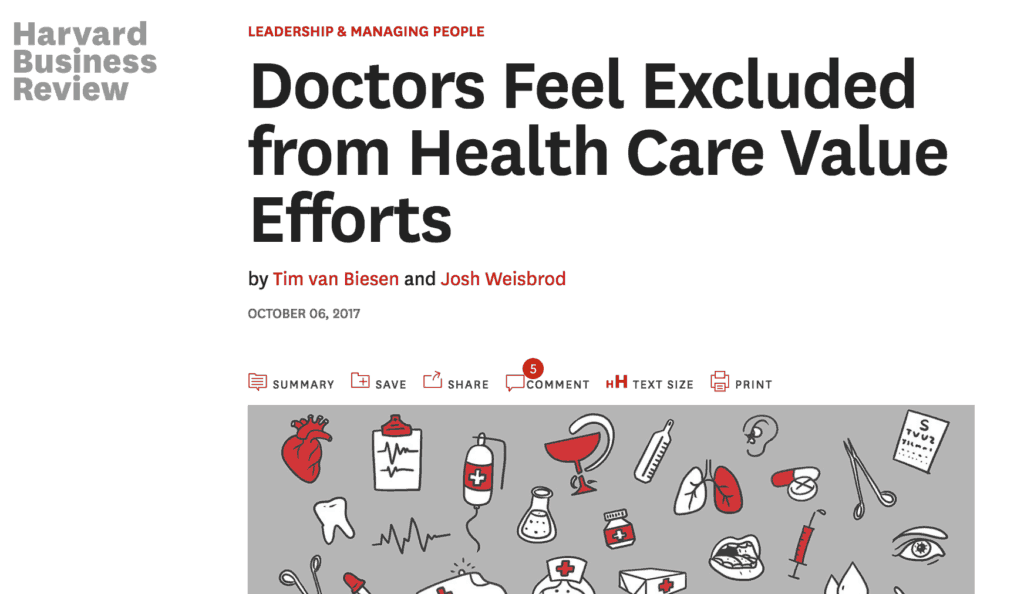Thanks to those of you who sent me this HBR article:
Doctors Feel Excluded from Health Care Value Efforts
Hear Mark read this post — subscribe to Lean Blog Audio
Long story short… brought to you by Bain consultants: Doctors don't like being excluded and organizational satisfaction goes up when you engage and include people. Brilliant!
Obvious?

As the U.S. has experimented with different healthcare management and cost containment approaches:
“… physicians have been slow to embrace these for a host of reasons. Chief among them, our research shows, is that they feel excluded from the process.”
That's an understandable complaint. When we try to tell people what to do, they'll tend to push back, especially in complex situations in which everybody hasn't agree on a path forward.
That was one theme of the podcast I recorded yesterday (release coming later this month) with the three co-authors of the outstanding book Motivational Interviewing for Leadership.
The HBR article says:
“The only practical way to make value-based care a reality is for health care organizations to bring physicians back into the decision-making process.”
One reason, it seems, that physicians were hesitant to move forward was not having clear evidence that these changes would be improvements. That means they were probably in a state of psychological “ambivalence” about the change and, as my podcast guests pointed out, telling people they need to change is not going to be very effective in those circumstances of ambivalence.
Again, from HBR:
“Without [evidence], they see little reason to alter the status quo. That's a fundamental and overlooked obstacle to progress. And it explains why management-led organizations that have not embraced physician input have run into resistance.”
Instead of blaming the doctors for being “resistant to change,” healthcare leaders and policy makers should work with them. Engage them.
The HBR authors' research found:
“Physicians clearly understand the challenge posed by rising costs for clinical care and prescription drugs, but many don't feel they are in a position to help rein in costs. They do not feel sufficiently engaged in making important decisions about cost control, performance improvement, and adoption of new reimbursement models. Indeed, many feel overruled, with mandate after mandate from hospitals and management-led health organizations being done to them, not with them.“
Toyota people and Lean leaders, of course, emphasize the need for change to be done with people, not to them.
It might seem obvious, but:
“By contrast, physicians who are engaged in decision-making are much more satisfied with the working environment and are more willing to lead change. Our research and experience shows that health care organizations that give physicians a say in management decisions are able to create greater momentum for change.”
The article also shares an example of surgeons collaborating with procurement. Working together leads to a “virtuous circle.”
If doctors “feel” like they're not included, the best prescription is to ACTUALLY include them (as opposed to making them “feel” like they're involved).
I think the same is true for most any other group or class of employee… they want to be engaged and involved in change. And they're happier when they're engaged. That leads to better performance for the organization, all around.
Is your organization taking steps to make sure change is done with people instead of being done to them?
What do you think? Please scroll down (or click) to post a comment. Or please share the post with your thoughts on LinkedIn – and follow me or connect with me there.
Did you like this post? Make sure you don't miss a post or podcast — Subscribe to get notified about posts via email daily or weekly.
Check out my latest book, The Mistakes That Make Us: Cultivating a Culture of Learning and Innovation:










This. Again and always. So common, that I prepared a classic Elevator Speech should anyone ask what I did for a living:
“I create environments where people with differing (and often conflicting) agendas can come together and decide how to overcome the barriers that stand in the way of best patient care. It’s not about telling people what they should do; it’s about allowing them to discover that working with people in other disciplines is a powerful way to improve performance.
Even if you know where the problem begins and have a perfect solution in hand, humans only engage, take ownership and become accountable when they participate in finding problems, testing solutions and deciding how to measure success. Once people have a personal experience of collaborating with others and achieving success, they will become the organization’s strongest advocates for improvement programs. ”
Yeah, there’s no mention of Lean, Six Sigma, PDCA or any methodology that might spook the horses.